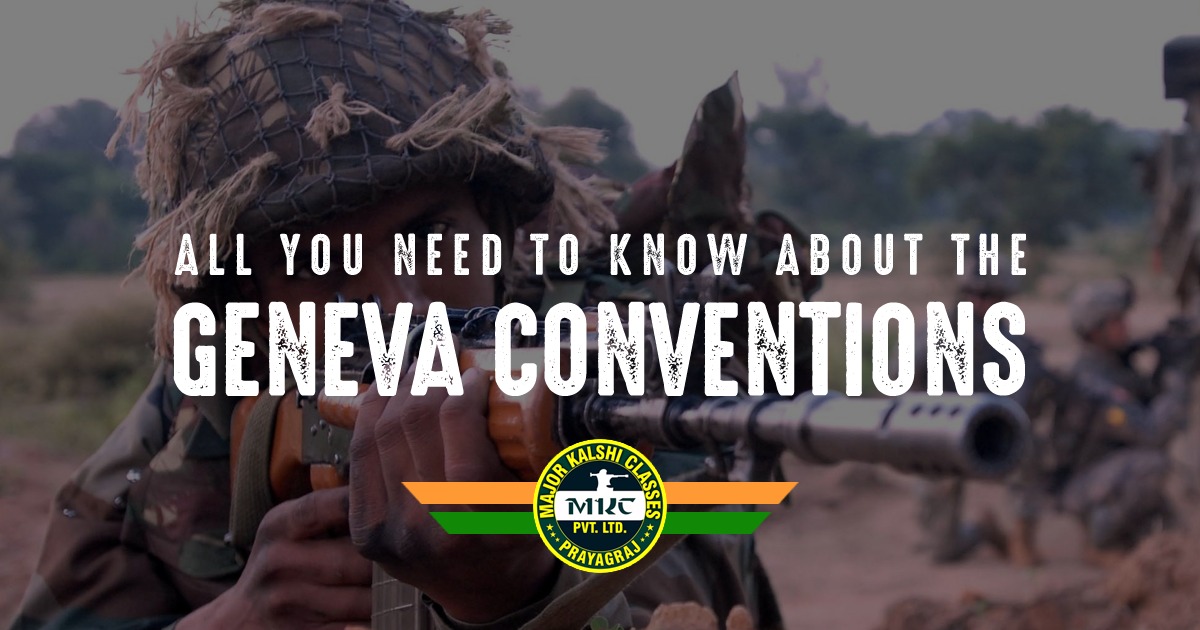All you need to know about the Geneva Conventions
Geneva Conventions – Pakistan Prime Minister Imran Khan announced on Thursday that captured Indian Air Force Wing Commander Abhinandan Varthaman would be released on Friday as a “peace gesture”. By sending the pilot to India hale and hearty, the Pakistanis would have fulfilled an unusually odd demand from India’s ultra-nationalist TV channels and their sullen military analysts who have asked Pakistan to abide by the Geneva Conventions in dealing with the Indian captive. The Indian government has also cited international conventions in their communiqué on the incident.
What are Geneva Conventions?
Table of Contents
Geneva is a city in Switzerland where an agreement was negotiated in the aftermath of the Second World War (1939–45) for international law for humanitarian treatment in war. Comprising of four treaties, and three additional protocols, Geneva Conventions proposed a system for the prisoners of war and for their treatment and aid in foreign conflict.
Geneva Conventions usually denotes the agreements of 1949, which updated the terms of the two 1929 treaties, and added two new conventions. Moreover, the Geneva Conventions also defines the rights and protections to the innocent civilians, yet, because the Geneva Conventions are made for the people in war.
Four treaties of Geneva Conventions
- The First Geneva Conventions “for the Amelioration of the Condition of the Wounded and Sick in Armed Forces in the Field” was the fourth update of the original 1864 convention and replaced the 1929 convention on the same subject matter.
- The Second Geneva Conventions “for the Amelioration of the Condition of Wounded, Sick and Shipwrecked Members of Armed Forces at Sea” replaced the Hague Convention (X) of 1907. It was the first Geneva Convention on the protection of the victims of maritime warfare and mimicked the structure and provisions of the First Geneva Convention.
- The Third Geneva Conventions “relative to the Treatment of Prisoners of War” replaced the 1929 Geneva Convention that dealt with prisoners of war.
- In addition to these three conventions, the conference also added a new elaborate Fourth Geneva Conventions “relative to the Protection of Civilian Persons in Time of War“. It was the first Geneva Convention not to deal with combatants; rather it had the protection of civilians as its subject matter.
Diplomatic meaning of Geneva Conventions in India Pak Situation
In diplomacy, the treaties of Geneva Conventions do not have its usual meaning. Rather, it is used in diplomacy to mean an international agreement or treaty between countries.
According to the rules, the status of POW only applies in international armed conflict.
- “POWs are usually members of the armed forces of one of the parties to a conflict who fall into the hands of the adverse party,” the Convention states.
- It says POWs cannot be prosecuted for taking a direct part in hostilities.
- “Their detention is not a form of punishment, but only aims to prevent further participation in the conflict. They must be released and repatriated without delay after the end of hostilities. The detaining power may prosecute them for possible war crimes, but not for acts of violence that are lawful under International Humantarian Law,” it says.
- The rules specify that POWs must be treated humanely in all circumstances.
- “They are protected against any act of violence, as well as against intimidation, insults, and public curiosity,” the Geneva Conventions
Was our IAF pilot a prisoner of war?
Neither the Indian MEA nor its Pakistani counterpart has identified the pilot as a PoW.
However, as per the third Geneva Conventions, “The convention applies to all cases of declared war or of any other armed conflict which may arise between two or more of the signatories, even if the state of war is not recognized by one of them.”
- Accordance with Article 118, first paragraph, of the 1949 third Geneva Conventions, “Prisoners of war shall be released and repatriated without delay after the cessation of active hostilities” and “unjustifiable delay in the repatriation of prisoners of war or civilians” is a grave breach of the Protocol.
- Once PoW status is awarded to a combatant, he may be interned without any particular procedure or reason. The purpose of this internment is not to punish them but only to hinder their direct participation in hostilities.
- Article 13 of the third convention states: Prisoners of war must at all times be humanely treated. Any unlawful act or omission by the Detaining Power causing death or seriously endangering the health of a prisoner of war in its custody is prohibited, and will be regarded as a serious breach of the present Convention.
Likewise, prisoners of war must at all times be protected, particularly against acts of violence or intimidation and against insults and public curiosity. Measures of reprisal against prisoners of war are prohibited.
ALSO READ – PULWAMA ATTACK – ‘GAME OVER’ FOR PAKISTAN
We hope that this article should’ve provided you with great details about the Geneva Conventions. For any other enquiries, visit
- our official website
- at Shapath Building, 105/244, Tagore Town, Allahabad – 211002
For detailed information of Notifications, Syllabus or Tips and Tricks, Admit Card Dates, Result, Cut off, Trend Analysis, Information about Physical Fitness Test and Medical Examination and Current Affairs, visit our Youtube account.
Feel free to share your thoughts about this article on the comment section below.
https://youtu.be/QIDd3qy0X3w










